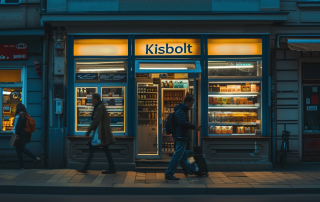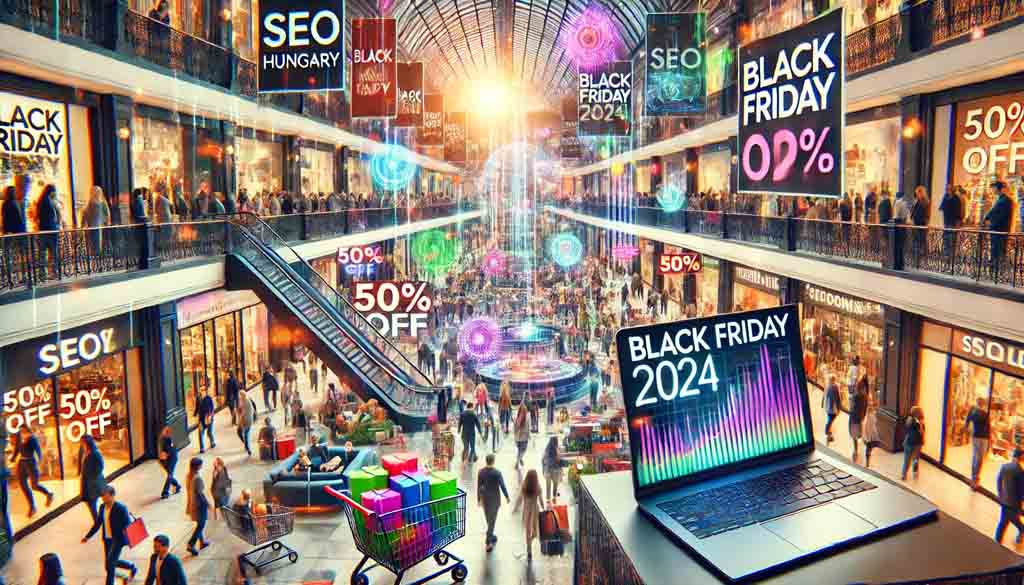
Today, Black Friday is not just a calendar date or a weekend, but a global phenomenon that is both an economic engine and a social reflection. The tradition, which started in the United States, has now conquered the world and every year in November it starts a wave of consumers that makes its impact felt both online and offline.
But what makes Black Friday so special? First of all, it perfectly combines the psychology of consumption, economic interests, and innovative digital marketing tools such as search engine optimization (SEO). The event has its roots in the day after Thanksgiving, when people traditionally started shopping for Christmas. To this day, it is one of the most important commercial events of the year, which significantly affects not only the wallets of customers, but also the annual balance sheets of companies.
The economic effects of Black Friday
The event affects not only consumer habits, but also economic indicators. In 2023, for example, US shoppers will spend more than $9.8 billion online alone Black Friday during promotions - this number grows every year and is not limited to the United States. It also plays a significant role in the retail sector in Hungary: according to GKI Digital data, in 2022, 75% of domestic customers took part in some kind of Black Friday sale, and the volume of online purchases exceeded HUF 70 billion.
Changes in customer habits
With the strengthening of the digital space, customers increasingly prefer online sales. Black Friday is no longer just a day: many companies advertise all-weekend and even all-month sales. Platforms such as Amazon or Aliexpress are generating global competition, while smaller local businesses are also trying to take advantage of the wave of demand.
However, the event has not only positive but also negative social effects. The problem of overconsumption, the burden on the environment and the overloading of workers are all downsides that more and more people are talking about. At the same time, sustainability-supporting alternatives such as "Green Friday" or "Buy Nothing Day" are playing an increasingly important role.
The role of SEO
Black Friday is essential for success search engine optimization. Companies spend a lot of energy and budget on making their promotions a Google to the top of the search results list. A well-targeted SEO strategy can generate traffic worth several million forints. For example, the keyword "Black Friday 2024" dominates searches months before the event, and the long tail keywords - for example "cheap laptop Black Friday sale" or "smartphone discount" - smaller companies can also compete with the big ones.
The introduction therefore not only presents the global economic significance of Black Friday, but also its social and digital aspects. The event not only shapes customer habits, but also explores new opportunities for digital marketing through year-on-year growing demand and competition.
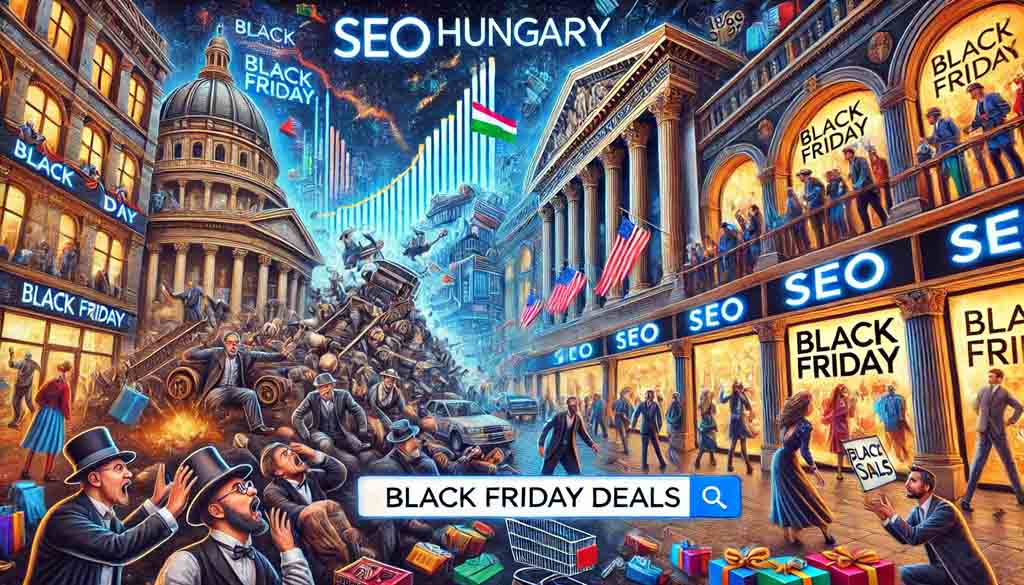
The origin of Black Friday
For many, the concept of Black Friday means a celebration of sales and huge discounts, but in terms of its origin, the adjective "black" does not evoke the joy of shopping, but rather a previous economic collapse. The American "Black Friday" of 1869 occurred at the height of gold speculation, when two investors, Jay Gould and James Fisk, tried to monopolize the American gold market. Their action eventually led to a catastrophic collapse that hit the American economy and ruined many families through the stock market panic. Although this event has nothing to do with today's shopping culture, it is where the term "Black Friday" comes from.
The birth of the modern Black Friday
Black Friday in today's sense appeared in the 1950s and 60s in the United States, especially in Philadelphia. The name came to be used by local police to describe the chaos that occurs on the Friday after Thanksgiving, when huge crowds flood the city for football games and Christmas shopping, resulting in traffic jams and extreme congestion.
However, the shops quickly recognized the opportunity inherent in the sun. By the middle of the 20th century, the custom had developed that the Friday after Thanksgiving brings the biggest discounts and traffic of the year. This is where the often-mentioned metaphor comes from, that the stores then "come out of the red" (i.e. from loss-making mode) and close the day "in the black", which represents profit.
It is the central event of consumer culture
Black Friday has now become one of the biggest events in global consumer culture. The growth of online commerce has only reinforced this trend. For example, Amazon launched Cyber Monday in 2005, which added a new dimension to the Black Friday period by expanding online sales.
The global spread is also noteworthy: while Black Friday was initially an exclusively American phenomenon, it has now become a part of Europe, Asia, and even Africa. In Hungary, the event exploded especially in the last 10 years, and domestic retailers now see it as an indispensable marketing tool.
Interesting facts and statistics
- Historical records: US shoppers spent $9.8 billion online alone on Black Friday in 2023, up 7% from the previous year.
- Hungarian influence: In 2022, domestic online purchases amounted to more than HUF 70 billion during the Black Friday period.
- Online vs Offline: 65% of shoppers at the event now prefer online deals, reducing in-store chaos.
Black Friday is therefore clearly more than a simple shopping day: an economic, social and cultural milestone that reflects both modern consumer habits and the functioning of the global market.
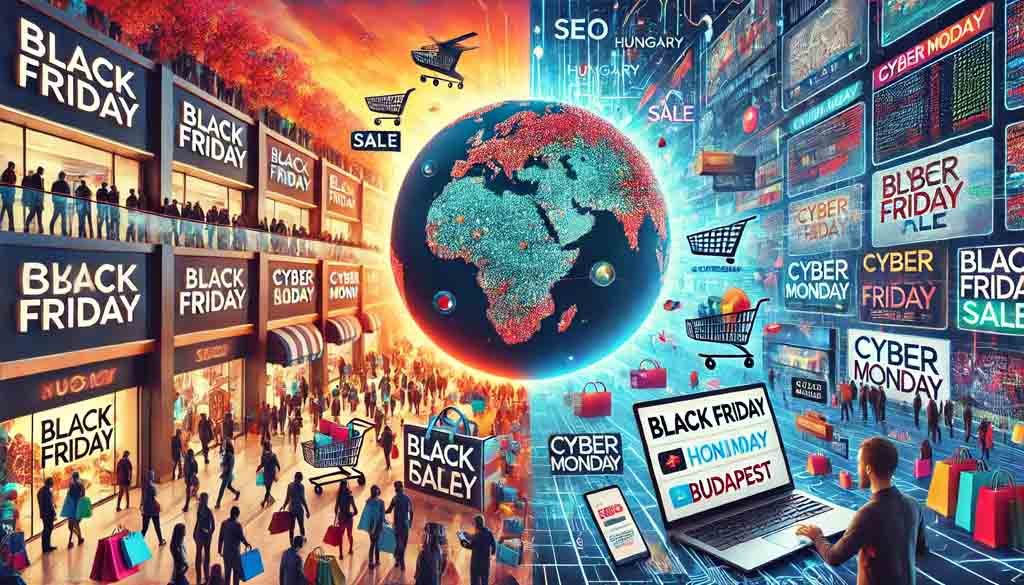
Black Friday and the Rise of Consumer Culture
Black Friday is now the epitome of modern capitalism and mass consumption, a day that generates enormous consumer activity and economic impact worldwide. However, its story is not just about huge sales and crowded malls – this day also affects human psychology, global market dynamics and the digital world.
A symbol of modern capitalism
Black Friday is one of the strongest examples of consumer culture. The day, during which customers tend to make impulsive decisions, reflects the side of modern capitalism that elevates consumption as one of the engines of economic growth. For shoppers, Black Friday is a day of "must-see opportunities," while for retailers, it's one of the most important times of the year to generate significant revenue.
Human psychology also plays a decisive role: creating a sense of artificial scarcity, such as "Offers available today" and "Limited stock" messages, effectively encourages impulse purchases.
Cyber Monday: The Revolution of Online Shopping
With the advance of online commerce, Cyber Monday caught up with Black Friday, which opened new doors specifically for e-commerce. It was launched in 2005 by American retailers to direct similar attention to online shopping. In recent years, this day has become more and more important: in 2023, for example, it generated more than 11 billion dollars in turnover worldwide, thus surpassing the online turnover of Black Friday.
Cyber Monday clearly reflects the growth of e-commerce. During the event, customers from anywhere in the world can take advantage of the sales, thereby reducing the crowding of offline shopping.
The path to internationalization
Black Friday was originally an American holiday, but has now become a global event. It began to spread in Europe in the 2010s, and today, from the United Kingdom to Germany to Hungary, sales are held in almost every country on this day.
In Hungary, the first Black Friday promotions were introduced by larger electronics stores, but now smaller retailers and service providers have also joined the trend. eMAG, for example, sold nearly 3 million products during Black Friday in 2022, which shows the huge growth potential of the domestic market.
Interesting facts and statistics
- Hungarian data: According to GKI Digital, in 2022, more than 1.2 million customers turned to online marketplaces during Black Friday sales in Hungary.
- International impact: In the United States, shoppers spend an average of $350 on Black Friday, while in Europe this amount is around €120.
- Digital dominance: In 2023, Cyber Monday attracted more customers worldwide than Black Friday itself, signaling the advance of online shopping.
So Black Friday is not just about shopping: it is a global phenomenon that is reshaping the future of commerce, marketing and consumer behavior.
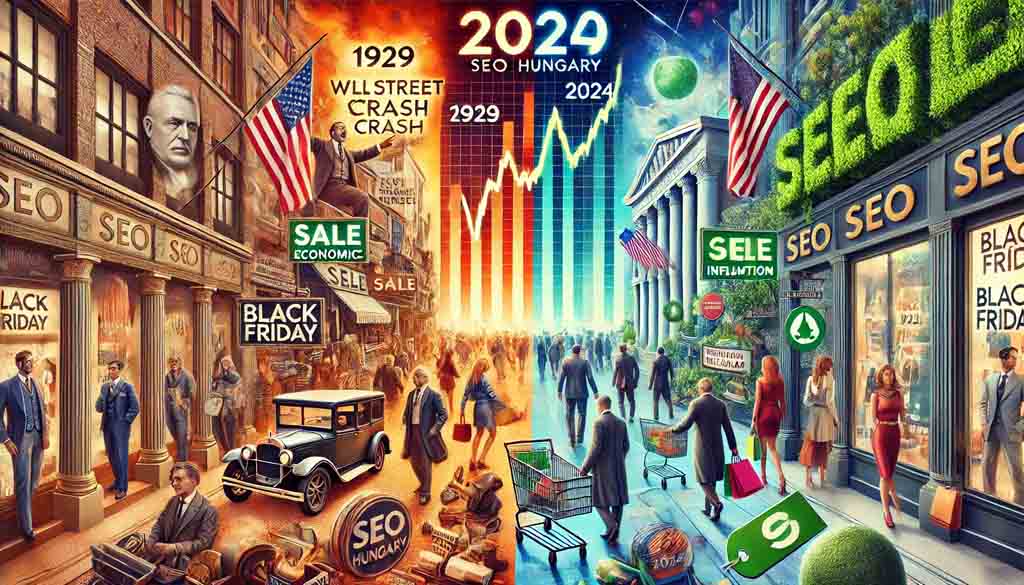
The role of economic effects and crises
Black Friday should be examined not only as a central event of consumer culture, but also in the light of economic changes. The history and current operation of the event shows how global and local economic trends shape customer behavior.
The Wall Street Crash of 1929: The Limits of Capitalism
The Great Depression of 1929, which was triggered by the collapse of Wall Street, has important lessons for Black Friday as well. Excessive speculation in the markets and the accumulation of debts led to the disaster, which drastically changed not only the stock market, but also consumer habits. The crisis highlighted how much consumer overspending can destabilize the economy. Today's Black Friday, which is also based on the overdrive of consumer desires, focuses on the issue of sustainable shopping, especially in light of the current economic challenges.
2008 financial crisis: The birth of new consumer habits
The financial crisis of 2008 once again posed a serious challenge to the global economy. People's saving habits have changed, and many have started to turn to "value for money" solutions. Black Friday then became an ideal event for thrifty shoppers, where it was possible to buy valuable products even with a limited budget.
Another important impact of the crisis was the explosive growth of online shopping. E-commerce has given merchants the opportunity to minimize their costs while reaching a wider range of customers. Today's Black Friday is partly due to this trend, as digital platforms play a significant role in the event's success.
Economic situation in 2024: Inflation and sustainability
The current economic situation is dominated by inflation and declining purchasing power. Due to rising energy prices, problems in global supply chains, and rising food prices, consumers are now much more prudent. According to EY's 2024 study, 72% of shoppers are more value-conscious and prefer offers that offer real savings.
At the same time, sustainability aspects are getting more and more emphasis. More and more customers are looking for green alternatives, while companies are trying to combine discounts with environmental awareness with "Green Friday" campaigns.
How does Black Friday affect the economy?
- Globally: Black Friday is one of the biggest consumer events, generating hundreds of billions of dollars in sales each year. In 2023, for example, the global turnover exceeded 200 billion dollars, and this amount continues to grow.
- At the local level: In Hungary, Black Friday in 2022 brought a turnover of nearly HUF 120 billion, a significant part of which came from online purchases. According to KSH data, the event also contributes to the domestic GDP, as it boosts the retail sector.
Interesting statistics
- Effect of inflation: 85% of US consumers said they will spend less on Black Friday in 2024 than the previous year due to inflation.
- Sustainability: 40% of European shoppers prefer companies that offer sustainable deals during Black Friday.
Black Friday therefore both drives the economy and reflects its fragility, while showing new directions in consumer behavior and corporate strategies.

Social and environmental issues
Black Friday has a significant impact not only on the economy, but also on society and the environment. Although the day promises the joy of discounts and shopping, overconsumption, the relegation of employee rights and the manipulation of customer psychology also show downsides.
The problem of overconsumption
Black Friday brings about one of the biggest shopping sprees of the year. Although this is favorable for the economy, it also causes serious environmental problems. Due to impulse purchases, a lot of products end up in the trash in a short time. According to a 2022 study, 80% of people in the UK bought something on Black Friday that they never used afterwards. This unnecessary consumption not only contributes to the depletion of natural resources, but also overloads the waste management system.
Environmental impacts and sustainability:
- The carbon footprint of manufactured products increases drastically. According to some estimates, CO₂ emissions from parcel delivery increase globally by 30% during the Black Friday period.
- The production of fast-moving fashion items and electronic devices puts a significant burden on the environment, while consumers often ignore sustainability due to cheapness.
Employee rights in the commercial sector
Black Friday is one of the busiest times of the year for retail workers. Due to the huge workload in stores and online stores, many places have employees working extremely long shifts, often without overtime.
Challenges for employees:
- Low wages: According to a 2023 US survey, 70% of trade workers are paid minimum wage while working significant overtime.
- Physical and mental strain: Employees in stores are often faced with impatient customers, while warehouse workers and couriers are faced with increased logistical demands.
Some critics of Black Friday therefore also refer to the event as a "celebration of the exploitation of workers", which highlights the vulnerability of workers in the commercial sector.
Manipulation of customer psychology
The success of Black Friday is largely based on the subtle manipulation of customer psychology. The marketing campaigns behind the event build on the feeling of 'missed opportunity', encouraging people to buy immediately, even if they don't really need the product.
Psychological tricks:
- Limited stock: Messages like "Valid today only!" or "Only 5 left in stock!", they create urgency.
- Amount of discount: Significant sales such as "-70%" are attractive but often misleading as the product's original price is artificially inflated prior to the sale.
- Community pressure: The rapid decline in customer reviews and products creates the feeling that those who don't buy are missing out.
These manipulations not only encourage impulse buying, but can also cause financial instability for customers in the long term.
Interesting statistics
- During Black Friday 2022, 40% of US shoppers reported purchasing a product they later regretted.
- 30% of online orders are returned, which means an additional logistical and environmental burden.
- Amazon warehouse workers handle an average of 60% more packages on a single Black Friday than any other day of the year.
Black Friday thus simultaneously serves the needs of customers and sheds light on the dark sides of consumer society, while the event is increasingly criticized for its environmental and social effects.
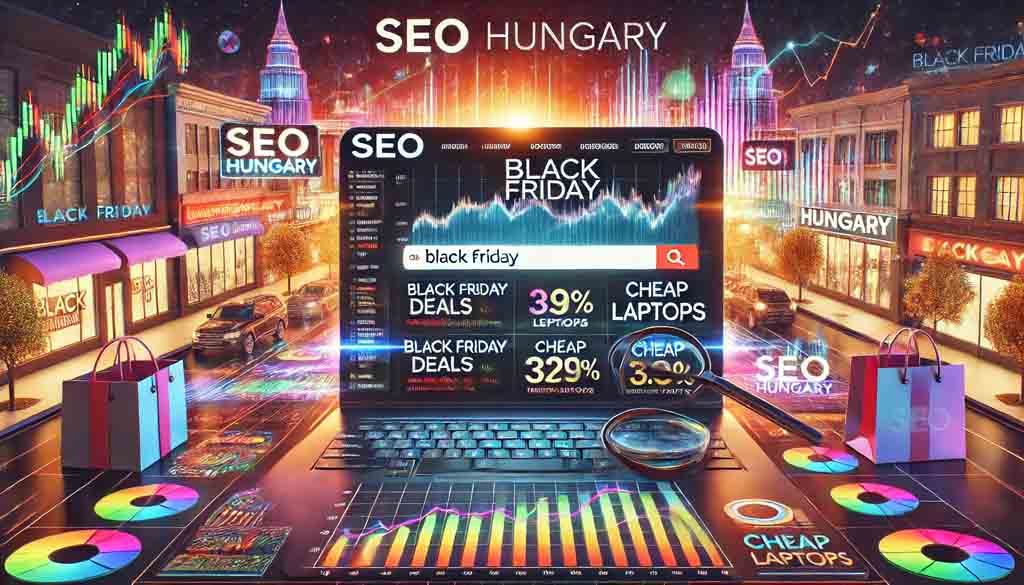
The role of search engine optimization (SEO) in Black Friday
Today, the success of Black Friday does not only depend on lines in stores or colorful posters - the competition in the online space is just as decisive. Due to the dominance of online information gathering and shopping, search engine optimization (SEO) plays a critical role in how well a business can take advantage of Black Friday.
Why is SEO Critical During Black Friday?
Nowadays, Black Friday is much more than a one-time shopping spree: it is the central element of a precise digital marketing campaign planned months in advance. Over 60% of shoppers use the internet to find the best deals. During the event, millions enter keywords such as "Black Friday sales" or "discounts" into the search engine, which makes it clear that SEO the importance of its role.
Prominent placement in the search engine results list is crucial, as the first three results receive more than 50% of the clicks. This means that companies that have well-optimized content can gain a significant advantage.
The dominance of online shopping and the role of search engines
A significant part of Black Friday shopping is already done online. US consumers will spend more than $9.8 billion online during Black Friday in 2023, and that number is growing every year. In Hungary, e-commerce is also constantly expanding: according to data from GKI Digital, domestic online traffic during the Black Friday period reached HUF 70 billion in 2022.
Search engines, especially Google, play a crucial role in this process. When looking for deals, shoppers often focus on general offers such as "cheap laptop Black Friday" or "discount TV" rather than specific brands or stores.
Competition for visibility: how can companies achieve better rankings?
THE SEO it's also about visibility during Black Friday. Companies have to compete to get to the top of the search results. The following strategies are key to this:
- Keyword optimization: Using keywords like "Black Friday deals", "discounts", or "cheap laptop Black Friday" is essential. Long tail keywords like “Black Friday TV deals 2024” are also beneficial because they have less competition.
- Content creation: Helpful content such as blog articles, how-to guides, or “Top 10 Black Friday Deals” lists will attract readers and increase organic traffic.
- Technical SEO: Fast page loading, mobile-friendly design and the use of structured data help search engines to better understand the page and rank it higher.
- Local SEO: For local searches, for example "Black Friday deals Budapest", companies can rely on their local presence to stand out from the competition.
Keywords and trends: What works in 2024?
During Black Friday SEO campaigns, some keywords stand out every year:
- "Black Friday 2024 Deals"
- "Best Black Friday Deals"
- "Cheap Smartphone Black Friday"
- "Gaming laptop discounts"
- "Black Friday Sale Clothing"
These keywords not only reflect the intentions of customers, but also give companies the opportunity to target their potential customers more precisely.
Interesting statistics
- 70% of customers click on one of the links on the first page of Google.
- Buyers from organic results are 30% more likely to convert than those from paid ads.
- In 2023, Black Friday keyword searches exceeded 7 billion worldwide.
SEO is therefore not only a tool, but also a strategic factor that determines the sales during Black Friday digital success chances.

SEO Strategies for Black Friday Campaigns
The period of Black Friday is one of the most intense online shopping events of the year, and for companies it is the peak period of digital competition. Search engine optimization (SEO) plays a key role in helping a business successfully stand out from the crowd and reach potential customers. Below are the most effective SEO strategies to maximize Black Friday the effectiveness of your campaign.
Content Optimization: The Power of Valuable Content
The basis of successful Black Friday campaigns is relevant, valuable and searcher-friendly content. Shoppers often look for comparison items, tips or specific offers during sales.
Important steps:
- Creating blog articles and guides: Use catchy headlines like "Top 10 Black Friday Deals 2024" or "How to Find the Best Black Friday Deals?". These contents not only generate traffic, but also help customers find their way around.
- Update promotional pages: Make sure your promotion pages include seasonal keywords like 'Black Friday 2024 deals', 'best discounts' or 'Black Friday laptop deals'.
- Video content: Dynamic content, such as videos, increases site traffic and customer engagement.
Technical SEO: The technical basics of visibility
Technical SEO ensures that your website meets the requirements of search engines and that visitors can use it smoothly.
Main elements:
- Fast page loading: Page load speed is critical, especially on mobile. A slow website can not only result in the migration of customers, but also a disadvantage in Google ranking.
- Mobile-friendly design: More than 50% of purchases come from mobile during Black Friday, so responsive design is essential.
- Use of structured data: Data such as prices, inventory information, and sale expiration dates help search engines understand and highlight your page.
Link building: Building relationships in the digital space
Quality backlinks increase the credibility of your website and significantly contribute to SEO success.
Tips for effective link building:
- Writing guest blogs: Write guest articles on relevant topics for other websites, such as tech or e-commerce blogs. This way you can get valuable backlinks.
- Building partnerships: Work with other companies or influencers who can share your Black Friday campaigns. This is not only beneficial from an SEO point of view, but can also generate direct traffic.
Key statistics and facts
- The Google of your search results websites on the first page attract 70% more traffic than those on the second page.
- Pages using structured data are 20% more likely to be among the top results.
- Improving your page load speed by just 1 second can increase your page load by up to 7% conversion rate.
The effective application of SEO therefore not only increases visibility, but also maximizes the number of conversions, which is essential for the success of Black Friday.

Data and analytics: measuring the effectiveness of SEO
The key to the success of Black Friday campaigns lies not only in a well-planned SEO strategy, but also in accurate data analysis. Using the right analytics tools will allow you to understand how your website is performing and how organic traffic is impacting your revenue. Here's how you can use data to measure your SEO effectiveness.
Visit analysis: Google Analytics and Search Console
Google Analytics and Search Console are essential tools for analyzing SEO campaigns. With these, you can gain detailed insight into where your visitors come from, what keywords they search for and how they behave on your website.
Google Analytics key areas:
- User behavior: Which pages generate the most traffic? What is the bounce rate?
- Traffic sources: The ratio of organic searches to the total volume of traffic.
- Device usage: What devices do visitors come from (mobile, desktop, tablet)?
Search Console features:
- Keyword Analysis: Which keywords does your site rank for? For example: "Black Friday deals", "discounted laptops".
- Click through rates (CTR): How are search results performing?
- Indexing issues: Are all parts of your site clearly visible to search engines?
Conversion tracking: Sales from organic traffic
During Black Friday, it's not enough to just increase the number of visitors - the goal is to convert visitors into customers. This requires accurate measurement of conversions, i.e. actions that lead visitors to purchase.
Important metrics:
- Cart values: What is the average shopping cart value of customers? In the case of organic visitors, it is usually higher, since they found your site based on relevant searches.
- Conversion rate: How many visitors made a purchase out of the total visitor traffic?
- Analysis of abandoned baskets: Visitors who didn't complete a purchase - why did they abandon it?
Why are analytics critical during Black Friday?
Analytics allow you to react to the performance of your campaigns in real time. For example, if you see that a keyword is not getting enough clicks, you can quickly optimize the headlines and meta descriptions. The basis of successful campaigns is that you continuously improve by learning from the measurements.
Interesting statistics
- Buyers from organic traffic achieve a 20% higher conversion rate than those from paid advertising.
- During Black Friday, traffic to e-commerce sites increases by 50%, of which nearly 40% comes from organic searches.
- Abandoned carts 30% is due to slow page loading speed.
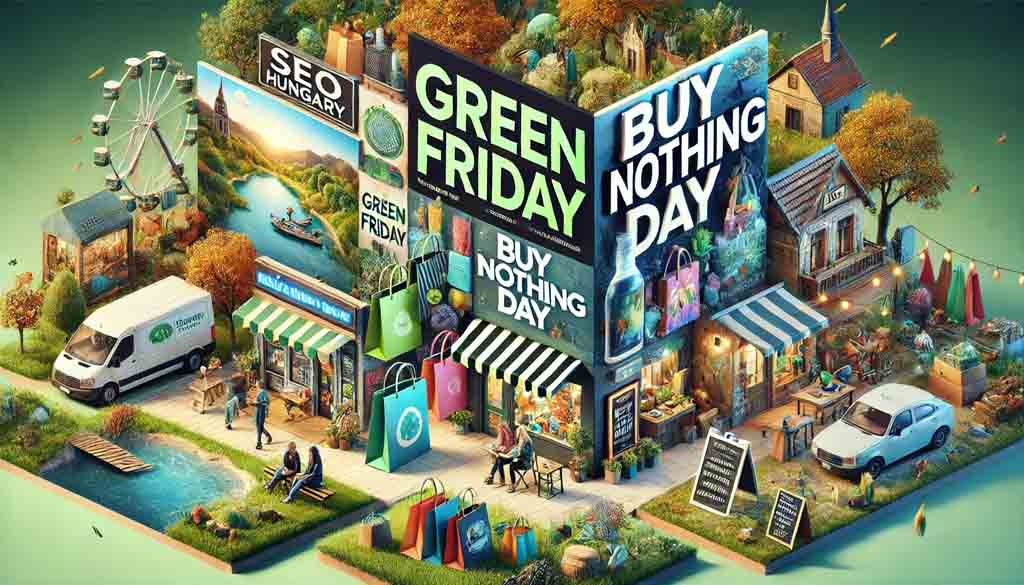
Alternatives and sustainability
Black Friday is the pinnacle of consumer culture, but at the same time, more and more people are questioning its sustainability. Due to overconsumption, waste and negative effects on the environment, alternatives have emerged that offer new directions for conscious consumers and businesses.
Sustainable shopping alternatives
In recent years, initiatives that prioritize sustainability and awareness against the Black Friday consumerism wave have become increasingly popular.
- Green Friday: The environmentally conscious choice
- The aim of the Green Friday movement is to encourage customers to make environmentally friendly decisions. Companies participating in the campaign offer sustainable products or donate part of their sales to charity.
- Example: The clothing brand Patagonia donates a portion of its income to environmental foundations every year.
- Buy Nothing Day: Awareness instead of shopping
- Buy Nothing Day ("Don't buy anything" day) encourages us not to buy at all on Black Friday, thereby expressing our resistance to consumer culture.
- This day is about self-reflection and rethinking consumer behavior.
The importance of supporting local merchants and small businesses
Black Friday is often about the dominance of large multinational companies, but local businesses also see it as a serious opportunity. Supporting small businesses is not only important from an economic point of view, but also from a social point of view.
- Community benefits: The income of local traders directly contributes to the development of the local economy.
- Unique products: Smaller businesses often offer unique, handmade products that can be more sustainable than mass-produced goods.
How can Black Friday be made more sustainable?
Making Black Friday more sustainable depends primarily on the attitude of companies and customers. The following strategies can help balance consumption and environmental impact:
- Prioritizing sustainable products:
- Offering products that are made from recycled materials or have a long life.
- Example: Discounted sales of refurbished devices in the case of electronic items.
- Value creation instead of excessive discounts:
- Stores could limit artificial price reductions and focus more on valuable services, such as repair guarantees or free shipping.
- Raising awareness:
- Customer education on how to choose more sustainable products or how to avoid overconsumption.
Interesting statistics
- Buy Nothing Day is present in 65 countries and is attended by millions of people every year.
- According to a 2023 study, 42% of shoppers would be happy to support companies that offer sustainable alternatives during Black Friday.
- On average, small businesses increase their traffic by 20% during Black Friday when they use a local marketing strategy.
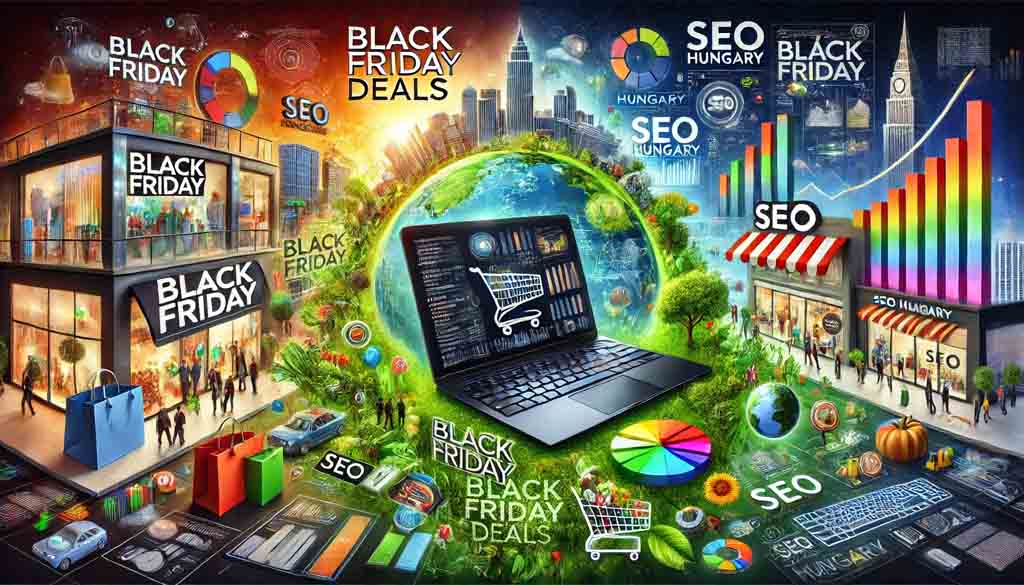
Today, Black Friday has become not only the pinnacle of consumer culture, but also one of the most complex events in economic, social and digital marketing systems. It is one of the most important moments in global trade, affecting market participants at all levels – from consumers to businesses. But is this festive shopping frenzy worth it?
The multidimensional significance of Black Friday
Economically: Black Friday plays a key role not only in increasing annual revenues, but also in dynamizing the global market. According to some estimates, the global revenue generated on Black Friday in 2023 exceeded $200 billion, 40% of which came from online sales.
Socially: This event shows both the power of modern society's shopping habits and its dark side. Overconsumption, waste and exploitation of workers are all issues that cast a shadow over the economic success of the day.
Digital marketing in terms of: The success of Black Friday is now unthinkable without digital strategies. Search engine optimization (SEO), PPC ads and that email marketing they not only generate short-term traffic, but also build long-term customer relationships.
The strategic importance of SEO
Search engine optimization is one of the most defining elements of Black Friday campaigns. A well-planned SEO strategy not only increases visibility during the event, but can also generate long-term organic traffic. Keywords such as "Black Friday deals 2024" or "discounted smartphones" not only attract the attention of customers, but also bring a relevant target group.
Structured data, fast page loading and responsive design all contribute to a website not only standing out in search results, but also bringing conversions. Data analysis, such as Google Analytics and Search Console, provides the opportunity to optimize the campaign in real time.
A call for conscious shopping and sustainability
Black Friday can not only be a celebration of shopping, but also of conscious decisions. Consumers should consider whether they really need the discounted products, while businesses should focus on sustainability.
- For consumers: Before buying, it is worth writing down what you really need and avoiding impulse purchases.
- For businesses: The introduction of Green Friday and other sustainable alternatives not only benefits the environment, but also increases brand loyalty in the long term.
Interesting statistics
- 70% of searches for Black Friday keywords starts already at the end of September.
- The from organic search traffic arriving customers are 25% more likely to return after the purchase.
- According to a 2023 survey, 45% of customers are willing to pay more if the product comes from a sustainable source.
Black Friday therefore provides an opportunity for customers and businesses to think more about their role in the economy and society. You can create a balance between economic interests and sustainability goals if both parties approach the event more consciously.


